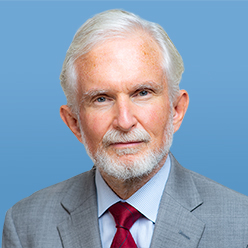The chairman of the Joint Chiefs of Staff, Adm. Mike Mullen, has repeatedly called for more emphasis on this country's nonmilitary instruments of international influence, and especially for a greater role, resources and capabilities for American diplomacy.
Adm. Mullen and his colleagues on the Joint Chiefs ironically represent a critical weakness in this country's diplomatic establishment - institutional leadership. Ask yourself, who leads the United States Foreign Service? Most readers will know the Army and Air Force have chiefs of staff, the Marine Corps a commandant, and the Public Health Service a surgeon general. But what of the Foreign Service? Who is in charge there?
The service does have a director general, but the job as now constituted is a shadow of counterpart positions in other national public services, let alone what is needed. President Obama has already met with the chiefs of the uniformed services and will do so regularly while in office. When was the last time any president met with a director general of the Foreign Service, or even knew such a position exists?
A number of very distinguished professional diplomats have been director general, plus some time-serving mediocrities. While in the Foreign Service, I was privileged to know a few of the better incumbents, but even they did not play a true leadership role in the Service nor enjoyed much recognition among the ranks of embassy and State Department staffs. The stature of the director general's office has sadly declined over many years. It is certainly not the job to which the best of the Foreign Service aspire.
What a contrast I witnessed during a year on loan to Marine Corps Headquarters. There the commandant genuinely leads Marines everywhere, and directs the future shape of the Corps. A true service chief is responsible for how his service will perform in 10 and 20 years' time, and even beyond, and assures that it receives the personnel, resources, technology and political support it requires. Above all, he is the advocate of that service in Washington and to the American public. Those essential roles are largely not performed within the Foreign Service.
The problem is twofold. First, diplomatic services tend to have weak institutional cohesion and esprit de corps; they attract talented individuals, but promote diplomatic rather than leadership skills. Second, the director general today has few resources and little authority, and has been relegated to a subordinate role within State Department management. The Foreign Service as a permanent entity like the military needs to be led by its own and not just administered by successive administrations.
Repeatedly in the past the Congress took the lead in reforming this country's foreign and security structures. Among reforms needing congressional oversight and new statutory authority great enhancement of the role of the Foreign Service director general. The position should be elevated in State's bureaucracy, given greater budget and staff, assigned authority for long-term development of American diplomacy in all aspects, and made accountable for Service improvement. The new director general should report not just to the secretary of state but to the president and on a regular basis to the Congress - just as do the uniformed service chiefs.
Above all, the new director general should take on the key advocacy role, mobilizing support for the diplomatic function on the Hill, in the media, among interested public groups, and from former members of the Service.
In most developed countries, the diplomatic service enjoys a stature sorely lacking here. In part this is because the Foreign Service does not engage the American public, press and Congress. When they do, members of the Service are often astonished at the good will and support they encounter. The director general should mobilize those views in building a diplomatic establishment worthy of this country in this century.
The American taxpayer supports the world's finest Marine Corps and Coast Guard - not just the biggest, but the best. In candor, I cannot assert the same for my former Service. American diplomacy is large and generally effective, but is by no means the highest quality among competing powers.
American leaders often turn to our military because it has no peers, while our diplomacy remains behind the times in qualifications, technologies and methods. Resources are needed, certainly, but so also is better leadership, starting within the career Foreign Service, with a renewed director general position able to stand comparison with the leaders of any of America's professional public services.
Want these sent to your inbox?
Subscribe
